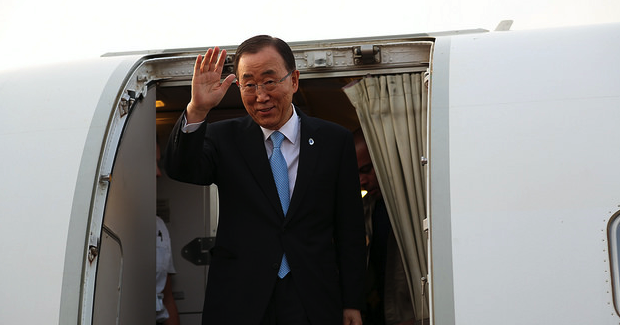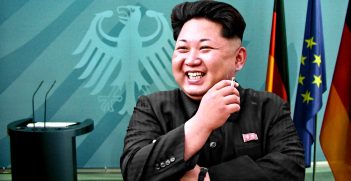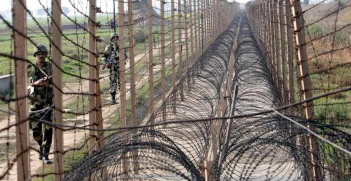Wanted: A UN Secretary-General with Courage and Integrity

Outgoing UN Secretary-General Ban Ki-moon had strong words for both Syria and Russia last week in the UN General Assembly. Yet this conviction has largely been absent on other equally outrageous occasions during his tenure. Nearly always, the UN chief is not what the world needs—an independent and activist secretary-general—but what the permanent members of the UN Security Council want. And what they want is a pliant and docile UN secretary-general.
Speaking in the UN General Assembly on 20 September, Secretary-General Ban Ki-moon did not mince his words in condemning Syria for brutality against its own people and indirectly criticising Russia for acting as the regime’s enabler. Reacting with unconcealed anger to the bombing of a humanitarian aid convoy on 19 September that killed around 20 civilians, Ban said: “Just when we think it cannot get any worse, the bar of depravity sinks lower”. He added: “The humanitarians delivering lifesaving aid were heroes. Those who bombed them were cowards”. Moreover, “powerful patrons that keep feeding the war machine also have blood on their hands”.
Strong words that would have resonated more if not delivered as the outgoing secretary-general’s final address–or if it had been matched with equally strong condemnation of other atrocities during Ban’s watch. In 2009 Colum Lynch, The Washington Post’s UN correspondent, reported that the UN community described Ban as an ineffective administrator responsible for the erosion of the UN’s moral authority. According to Lynch, UN staff were demoralised and member states disillusioned.
Syria is not the only theatre where humanitarians have been bombed. On 3 October 2015, US planes bombed a Médecins Sans Frontières hospital in Kunduz, northern Afghanistan, killing around 30 people including patients and health workers. MSF called it a war crime and the initial US denials of responsibility were quickly discredited as Washington kept changing its story. If a major Western NGO had not been the victim, Washington probably would not have needed to alter its initial version of the incident. That aside, the more pertinent point for present purposes is that Ban Ki-moon failed to condemn that attack in language matching the criticism of the bombing of humanitarian aid convoy in Syria eleven months later.
In 2009, responding to growing international outrage and pressure, Ban instituted a Board of Inquiry chaired by Ian Martin to investigate attacks on UN facilities and workers during Israel’s Operation Cast Lead in Gaza in December 2008–January 2009. Part of the treasure trove of confidential US diplomatic cables published by WikiLeaks in August 2014 includes a cable on 5 May 2009 from the US Mission to the UN to the State Department, copied to Jerusalem and Tel Aviv. It reports of the pressure exerted on Ban by US Ambassador Susan Rice to alter, suppress and ignore unfavourable findings and conclusions in the report of the inquiry.
Rice took strong exception specifically to recommendations 10 and 11 of the report which called on the Secretary-General to investigate other incidents involving the death or injury of personnel with the UN Relief and Works Agency (UNRWA), and the use of white phosphorus in Gaza’s populated urban areas including a UNRWA office and school. Rice at first demanded that these two recommendations not be transmitted to member states. When he demurred she asked that his covering letter should state that the Board of Inquiry, in making these, had exceeded its terms of reference and therefore the recommendations would be ignored. Ban assured her that his staff were working with the Israeli delegation to draft an acceptable cover letter.
In the event Ban’s cover letter said: “As for the Board’s recommendations numbers 10 and 11, which relate to matters that largely did not fall within its terms of reference, I do not plan any further inquiry”. In other words Ban had effectively collaborated with Israel and the US to undermine his own Board of Inquiry’s findings of possible Israeli abuses of human rights and violations of international humanitarian law.
In another, unrelated example of the Secretary-General capitulating to the powerful: on Monday 20 January 2014, Ban rescinded his last-minute invitation (delivered the day before) to Iran to participate in that week’s scheduled talks on the Syrian conflict to be held in Montreaux, on the shores of Lake Geneva in Switzerland. The US, UK and main Syrian opposition group had reacted with public expressions of anger and opposition to the invitation. On Tuesday 21 January, Russia’s Foreign Minister (and former ambassador to the UN) Sergei Lavrov said the UN decision to disinvite Iran was a mistake that would have a negative impact on the UN image.
The decision now looks extremely foolish in hindsight, given that Iran is a key player in Syria. The more serious point to consider is just what the two major Western powers thought they would gain long term by rubbing the Secretary-General’s nose in the dirt of public humiliation.
Writing in The Financial Times on 14 January, at the start of the year in which a new secretary-general would be chosen, Gideon Rachman commented: “there is little doubt that the UN now badly needs an effective secretary-general. During the nine years in which Ban Ki-moon has been in charge, the organisation has slipped to the sidelines of international politics”.
Unfortunately, there is many a slip between what the world needs and what the five permanent members (P5) of the UN Security Council are prepared to tolerate. Both Lynch and Rachman failed to acknowledge the responsibility of the P5, including the US and the UK, for producing weak leaders as secretary-general. Almost always, what the world gets as secretary-general is not what it needs but what the P5 want—and what they want is a pliant and docile, not an independent minded and activist secretary-general
As long as the UN General Assembly lacks the courage of its conviction and fails to assert itself to exercise a co-equal role with the Security Council in choosing the secretary-general—similar to their respective roles in choosing the judges of the World Court – a secretary-general with courage and integrity will be an exceptional, albeit welcome, surprise who has grown into the job instead of being chosen for these laudable qualities.
Professor Ramesh Thakur, a former UN Assistant Secretary-General, is professor in the Crawford School of Public Policy, Australian National University. The second edition of his The United Nations, Peace and Security is to be published shortly by Cambridge University Press.
This article is published under a Creative Commons Licence and may be republished with attribution.





